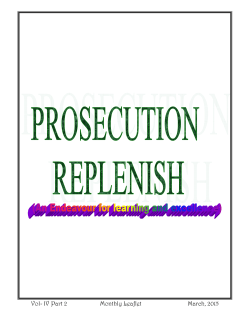
Upendra Narayan Singh @ Upendra Ku
IN THE HIGH COURT OF JHARKHAND AT RANCHI Criminal Miscellaneous Petition No. 2469 of 2014 --Upendra Narayan Singh @ Upendra Kumar Singh son of Late Shivjatan Prasad Singh, permanent resident of Village Alwarpur, PO Alwarpur, PS Gourichak, District Patna, Bihar … … Petitioner Versus Union of India through Central Bureau of Investigation … … Opposite Pary --CORAM: HON'BLE MR. JUSTICE RONGON MUKHOPADHYAY --For the Petitioner For the Opposite Party : Mr. Parth S. A. Swaroop Pati, Advocate : Mr. Md. Mokhtar Khan, ASGI --- C. A. V. ON – 15.12.2014 PRONOUNCED ON – 06.02.2015 Heard Sri P. A. S. Pati, learned counsel appearing on behalf of the petitioner, and Sri. Md. Mokhtar Khan, learned counsel appearing on behalf of the Central Bureau of Investigation. 2. In this application, the petitioner has prayed for quashing the order dated 05.06.2014 passed by the learned Sub-Divisional Judicial Magistrate cum Special Magistrate (C.B.I.), Dhanbad by which cognizance has been taken for the offences under Sections 120B, 323, 304 and 343 of the Indian Penal Code in connection with R.C. 1 (S)/2007 corresponding to S.T. No. 299 of 2010 which has been registered under Section 304/34 of the Indian Penal Code. 3. The prosecution story as per the First Information Report is that, the informant's son was taken to the Police Station on 22.12.2005 by the City D.S.P., and the then Officer Incharge, Sector 12 Police Station. It was alleged that subsequently his son was found dead on 01.01.2006 and that the case was of a custodial death. As such, the case was registered on the basis of direction of this Court passed in W.P.(P.I.L.) No. 1654 of 2006 vide order dated 22.12.2006. 4. After investigation was conducted by the C.B.I., a charge-sheet was submitted under Sections 120B, 323 and 343 of the Indian Penal Code dated 16.10.2008 against the petitioner and one Rukhsar Ahmad. So far as the other co-accused namely Smt. -2Sandhya Rani Mehta was concerned she was not charge-sheeted by the Investigating Officer. On a protest petition having been filed by the informant, the learned S.D.J.M. cum Special Magistrate (C.B.I.) vide order dated 09.02.2009 was pleased to take cognizance under Sections 120B, 323, 304 and 343 of the Indian Penal Code not only against the two charge-sheeted persons namely, Upendra Kumar Singh, the present petitioner and Rukhsar Ahmad, but also against Smt. Sandhya Rani Mehta, the then City Dy.S.P., Bokaro. 5. It further appears that on 11.08.2011 charges were framed against the petitioner for the offences punishable under Sections 120B, 304, 323 and 343 of the Indian Penal Code. 6. The co-accused Sandhya Rani Mehta against whom cognizance was taken by the learned Sub-Divisional Judicial Magistrate cum Special Magistrate, C.B.I., Dhanbad on 09.02.2009 challenged the same order before this Court in Cr.M.P. No. 1149 of 2009 which was disposed of on 16.04.2014 with the following observations: “Accordingly, the order taking cognizance is hereby quashed. However, the matter is again remanded back before the Magistrate to proceed in the matter in accordance with law as indicated above as early as possible preferably within a period of six weeks from the date of receipt of a copy of this order.” 7. Pursuant to the aforementioned order dated 16.04.2014 passed by this Court, the learned S.D.J.M. passed an order dated 05.06.2014 taking cognizance once again for the offences punishable under Sections 120B, 304, 323 and 343 of the I.P.C. and so far as criminal proceeding with respect to Mrs. Sandhya Rani Mehta is concerned, the same was dropped. 8. Assailing the impugned order taking cognizance, the learned counsel for the petitioner has submitted that vide order dated 09.02.2009 cognizance was already taken by the learned S.D.J.M. cum Special Magistrate, C.B.I. for the offences under Sections 120B, 304, 323 and 343 of the I.P.C. and pursuant to the said order taking cognizance, after commitment charges have also been framed against the petitioner vide order dated 11.08.2011. He has further submitted that cognizance for an offence cannot be taken twice and the learned cognizance taking Court has committed an illegality in once again taking cognizance for the offences mentioned therein. -39. The learned counsel for the C.B.I., on the other hand, has submitted that although cognizance has been taken twice, but the subsequent order taking cognizance would not vitiate the proceeding on the ground that the same is not an illegality, but a mere irregularity. 10. After hearing the learned counsel for the petitioner and learned counsel for the C.B.I. and after going through the record, the same reflects that admittedly cognizance was taken for the offences under Sections 120B, 304, 323 and 343 of the I.P.C. by the learned S.D.J.M. cum Special Magistrate, C.B.I. vide order dated 09.02.2009. The learned trial court had also framed charges against the petitioner vide order dated 11.08.2011. Subsequent to the remand by this Court in Cr.M.P. No. 1149 of 2009, a fresh order was passed on 05.06.2014 in which once again cognizance has been taken for the offences mentioned therein. 11. It is well-settled that cognizance of an offence can be taken only once. In the present case admittedly cognizance has been taken twice which is not permissible under the law. In the case of “Dharam Pal and others Vs. State of Haryana and another” reported in (2014) 3 SCC 306 with respect to the question as to whether under Section 209 of the Cr.P.C., the Magistrate was required to take cognizance of the offence before committing the case to the Court of Sessions it was held therein that: “39. ...............It is well settled that cognizance of an offence can only be taken once. In the event, a Magistrate takes cognizance of the offence and then commits the case to the Court of Sessions, the question of taking fresh cognizance of the offence and, thereafter, proceed to issue summons, is not in accordance with law. If cognizance is to be taken of the offence, it could be taken either by the Magistrate or by the Court of Session. The language of Section 193 of the Code very clearly indicates that once the case is committed to the Court of Session by the learned Magistrate, the Court of Session assumes original jurisdiction and all that goes with the assumption of such jurisdiction. The provisions of Section 209 will, therefore, have to be understood as the learned Magistrate playing a passive role in committing the case to the Court of Session on finding from the police report that the case was triable by the Court of Session. Nor can there be any question of part cognizance being taken by the Magistrate and part cognizance being taken by the learned Sessions Judge.” -412. In the present case, after the learned S.D.J.M. cum Special Magistrate, C.B.I. had already taken cognizance of the offence vide order dated 09.02.2009 and had committed the case to the Court of Sessions, where charges were also framed vide order dated 11.08.2011. The learned S.D.J.M. was precluded from taking fresh cognizance of the offences as has been done vide order dated 05.06.2014 as the same would not only be an irregularity, but also an illegality. Therefore, the order dated 05.06.2014 so far it relates to taking of cognizance for the offences punishable under Sections 120B, 304, 323 and 343 of the I.P.C. is concerned, the same being without the sanction of law deserves to be quashed. Accordingly, the order dated 05.06.2014 so far it relates to taking of cognizance is quashed with respect to the petitioner only. 13. This application is accordingly allowed. (Rongon Mukhopadhyay, J) R.Shekhar/NAFR/Cp.3.
© Copyright 2025










